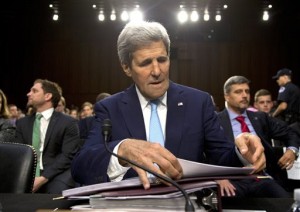US House approves arms for Syrian rebels

Secretary of State John Kerry settles into his seat as he arrives to testify on Capitol Hill in Washington, Wednesday, Sept. 17, 2014, during a Senate Foreign Relations Committee hearing on the US strategy to defeat the Islamic State group. AP
WASHINGTON — The Republican-controlled House voted grudgingly to give the U.S. military authority to train and arm Syrian rebels on Wednesday as President Barack Obama emphasized anew that American forces “do not and will not have a combat mission” in the struggle against Islamic state militants.
The 273-156 vote crossed party lines to an unusual degree in a Congress marked by near ceaseless partisanship. Top Republican and Democratic leaders backed the plan seven weeks before midterm elections, while dozens of rank and file lawmakers in both parties opposed it.
The provision was added to spending legislation that will assure the federal govrernment operates normally after the Sept. 30 end of the budget year. Final approval is expected in the Senate as early as Thursday.
Even supporters of the plan found little to trumpet. “This is the best of a long list of bad options,” said Rep. Jim Moran, a Democrat.
The president’s remarks and similar comments by House Democratic Leader Nancy Pelosi of California seemed designed to reassure liberal lawmakers that the new military mission would be limited.
Article continues after this advertisementOnly a day earlier, Gen. Martin E. Dempsey, chairman of the Joint Chiefs of Staff, drew widespread attention when he told Congress he might recommend the use of U.S. ground combat forces if Obama’s current strategy fails to stop the militants.
Article continues after this advertisementAcross the political aisle from the president and Pelosi, Republican Speaker John Boehner and House Majority Leader Kevin McCarthy swung behind the plan. Yet many members of their rank and file expressed concerns that it would be insufficient to defeat militants who have overrun parts of Syria and Iraq and beheaded two American journalists.
Republican lawmakers took solace in the short-term nature of the legislation. It grants Obama authority only until Dec. 11, giving Congress plenty of time to return to the issue in a postelection session set to begin in mid-November.
House Republican leaders arranged to tack the Obama-sought proposal onto a spending bill needed to keep the government operating past the Sept. 30 end of the budget year.
Approval would send the overall legislation to the Senate for all-but-certain final passage. Yet there, seven weeks before the elections, it seemed likely that no separate yes-or-no vote would be held on Obama’s new military strategy to train rebel forces in Saudi Arabia to be used in conjunction with potential U.S. airstrikes.
Instead, the Senate is likely to vote only once on the legislation combining approval for arming and training rebels with the no-shutdown federal spending provisions.
Officials put a $500 million price tag on Obama’s request to train and equip rebels. The cost generated virtually no discussion among lawmakers, who focused instead on the possible consequences of a new military mission not long after America ended participation in wars in Afghanistan and Iraq.
Testifying before a Senate Committee, Secretary of State John Kerry said the forces seeking to create an Islamic state ” must be defeated. Period. End of story.”
There was little, if any dissent on that, but debate aplenty about the best way to accomplish it.
“We simply don’t know if somewhere down the line it will turn our guns back against us,” said Rep. Loretta Sanchez, D-California, giving voice to a fear that rebels seeking the removal of Syrian president Bashar Assad would eventually prove unreliable allies.
Republican Rep. Tom McClintock expressed a different concern. “Committing insufficient force in any conflict is self-defeating, and airstrikes alone cannot win a war,” he said.
The day’s developments unfolded as Dempsey’s day-old remarks reverberated around the globe.
U.S. troops “will support Iraqi forces on the ground as they fight for their own country against these terrorists,” Obama told officers at U.S. Central Command, which oversees American military efforts in the Middle East. He added that “As your commander in chief, I will not commit you and the rest of our armed forces to fighting another ground war in Iraq.”
Vice President Joe Biden, asked on a visit to Iowa about Dempsey’s comment on the use of ground troops, said the general’s “conclusion is that it is not needed now.” Biden added: “We’ll determine that based on how the effort goes.”
Pelosi told reporters the day’s House action “is not to be confused with any authorization to go further. … I will not vote for combat troops to engage in war.”
In Baghdad, Iraq’s new prime minister told The Associated Press in an interview that his government wants no part of a U.S. ground combat mission. “Not only is it not necessary; we don’t want them. We won’t allow them,” Prime Minister Haider al-Abadi said.
Controversy over a new military mission overshadowed what otherwise might have been a noteworthy accomplishment for a Congress marked by near-constant gridlock. Passage of the legislation would eliminate any possibility of a partial government shutdown like the one Republicans triggered a year ago by trying to zero out Obama’s health care program.
The measure also renews the charter of the Export-Import Bank, which helps finance purchases of U.S. exports. That postpones until next June a battle between tea party forces opposing the bank and business-oriented Republicans who support it.
The legislation also includes $88 million to combat the outbreak of Ebola in West Africa.